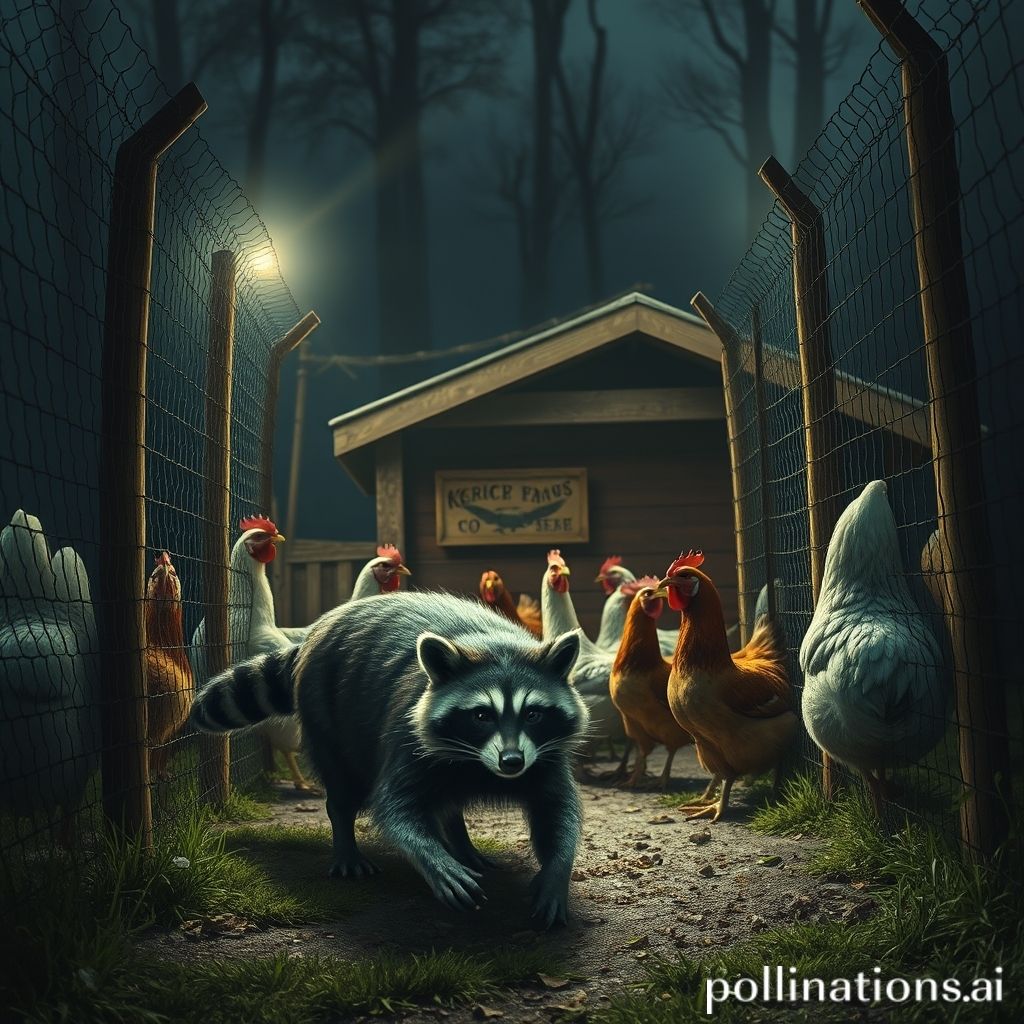Keeping your chickens safe from raccoons is a top priority for any poultry owner. These clever and mischievous critters can wreak havoc on your chickens, causing distress and even harm.
Fortunately, there are effective strategies and methods you can employ to keep raccoons away from your precious flock. From securing your chicken coop with sturdy fencing to implementing deterrents and traps, there are various options to choose from. In this guide, we will provide you with proven techniques and tips to safeguard your chickens from raccoon invasions. With these strategies in place, you can ensure the safety and well-being of your feathered friends.
Eaton Pet and Pasture, Premium Laying Hen Nesting Pads
Comfort and Quality for Your Hens
Grasping raccoon behavior
Raccoons are fascinating creatures known for their unique habits and behaviors. By Grasping their behavior, we can coexist with them and protect our property. Here are some important aspects of raccoon behavior:
1. Raccoon habits and feeding patterns
Raccoons are opportunistic omnivores, meaning they eat both plants and animals. They have adapted well to urban environments and are known to search for food in garbage cans, gardens, and even chicken coops. With their nimble paws and sharp claws, they can open containers and access hard-to-reach places. Raccoons also have a habit of washing their food in water before eating, which is why they are called raccoons.
2. Raccoon intelligence and problem-solving abilities
Raccoons are highly intelligent animals with excellent problem-solving skills. They have been observed using tools like rocks or sticks to access food or solve puzzles. Their adaptable nature allows them to thrive in different environments and overcome obstacles. To protect your chickens from raccoons, it is important to implement strategies that outsmart their intelligence and prevent them from entering the coop.
3. Raccoons as nocturnal animals
Raccoons are primarily active at night, making them nocturnal animals. They have exceptional night vision and sharp hearing, which helps them navigate and hunt in the dark. Their nocturnal behavior makes it difficult to spot them during the day, emphasizing the need for effective preventive measures to keep them away from your chickens.
To ensure the safety of your chickens and keep raccoons at bay, you can use various strategies. One effective method is to secure your chicken coop with sturdy fencing, ensuring it is buried at least a foot deep to prevent raccoons from digging underneath. Installing motion-activated lights or sprinklers around the coop can also startle raccoons and discourage them from approaching. Regularly removing any sources of food and potential attractions, such as fallen fruits or unsecured trash, can further help deter raccoons from your property.

Securing the chicken coop
Keeping raccoons away from chickens is vital to ensure the safety and well-being of your poultry. By implementing the following methods and strategies, you can effectively safeguard your chicken coop and prevent raccoon entry.
1. Choosing a secure location for the coop
When selecting a spot for your chicken coop, consider areas that are free from dense vegetation or trees that raccoons can utilize to gain access. Ensure the coop is placed on even ground and avoid low-lying areas that may flood or attract raccoons.
2. Strengthening the coop structure to prevent raccoon entry
It’s crucial to reinforce your chicken coop to make it raccoon-proof. Inspect the coop for any gaps, holes, or weak spots that raccoons can exploit. Use sturdy materials such as hardware cloth or heavy-gauge wire mesh to cover openings and secure them with screws or nails.
Pay special attention to:
- Windows: Install hardware cloth over windows or use predator-grade wire mesh screens to ensure raccoons cannot enter through these openings.
- Doors: Reinforce coop doors with strong latches or locks to prevent raccoons from prying them open.
- Roof: Secure the coop’s roof with heavy-duty materials to prevent raccoons from lifting or tearing it open.
3. Installing predator-proof fencing around the coop
Creating a barrier around your chicken coop is an effective way to keep raccoons out. Install a predator-proof fence that is at least 6 feet tall and extends at least 1 foot underground to prevent raccoons from digging under it.
Consider using electric fencing or adding a wire apron at the base of the fence to further deter raccoons. Regularly check the fence for any damage or potential weak spots.
| Raccoon-Proofing Tips |
|---|
| 1. Motion-activated lights: Install motion-activated lights around the coop to startle raccoons and discourage them from approaching. |
| 2. Secure food and water sources: Remove any food or water sources from around the coop that may attract raccoons. |
| 3. Trim nearby branches: Trim tree branches that are close to the coop to prevent raccoons from accessing the roof or upper openings. |
Implementing Preventive Measures
Implementing preventive measures is an efficient approach to discourage raccoons from targeting chickens. By employing different techniques, you can effectively deter raccoons from accessing and causing harm to your chicken coops. This ensures the safety and well-being of your poultry.
1. Utilizing Motion-Activated Lights
Installing motion-activated lights is one way to deter raccoons from approaching your chicken coops. Raccoons are nocturnal creatures and are sensitive to bright lights. By setting up lights that are triggered by motion, you can startle raccoons and discourage them from coming near your chickens. This method is particularly effective at night when raccoons are most active.
2. Implementing Noise Deterrents
Using noise deterrents is another effective method to deter raccoons. Raccoons are easily startled by loud and unexpected noises. You can install devices that emit loud sounds or utilize radio or music players to create continuous noise around your chicken coops. This will make raccoons feel threatened and uncomfortable, thus discouraging them from approaching your chickens.
3. Employing Scent Deterrents
Raccoons have a keen sense of smell, and certain scents can repel them. You can use various scent deterrents to keep raccoons away from your chicken coops. Some effective options include ammonia-soaked rags, predator urine, or strongly-scented herbs like mint or garlic. Strategically place these deterrents around your coop to create a barrier that raccoons will find unpleasant and choose to avoid.

Maintaining Cleanliness and Hygiene
Ensuring a clean and hygienic environment in and around your chicken coop is vital to avoid attracting raccoons. Follow these steps to minimize the risk of raccoon infestation:
1. Eliminating Food and Water Sources That May Attract Raccoons
Raccoons are opportunistic feeders and are drawn to easily accessible food sources. To discourage them from approaching your chicken coop, take the following precautions:
- Store chicken feed in secure, airtight containers to prevent odors from attracting raccoons.
- Promptly clean up any spilled feed from the coop area.
- Do not leave food or water bowls outside overnight.
2. Cleaning Up Spilled Feed and Ensuring Proper Waste Management
Proper waste management is crucial to prevent raccoons from being enticed to your chicken coop. Follow these guidelines:
- Regularly clean the coop and remove any accumulated droppings or litter.
- Dispose of chicken waste in a sealed container or compost pile away from the coop.
- Avoid keeping uncovered garbage cans or bins near the coop, as they can attract raccoons.
3. Maintaining a Clean and Debris-Free Coop and Surrounding Area
Raccoons are more likely to be attracted to messy and cluttered areas. Keep the environment clean by:
- Sweeping away any debris, such as fallen leaves or branches, around the coop.
- Regularly inspecting and repairing any holes or gaps in the coop structure that may serve as entry points for raccoons.
- Trimming tree branches that provide easy access to the coop.
Monitoring and Surveillance
Effective monitoring and surveillance techniques can help prevent raccoon intrusion and protect your chicken coop. By implementing the following strategies, you can keep raccoons away from your chickens and ensure their safety and well-being.
1. Installing Security Cameras
Setting up security cameras around your chicken coop can provide valuable insights into raccoon behavior and help you identify potential threats. Place the cameras at strategic locations, such as entry points or areas where raccoons are likely to approach. Regularly review the footage to monitor raccoon activity and take necessary actions.
2. Regular Inspections
Perform thorough inspections of your chicken coop on a regular basis to check for any signs of raccoon intrusion. Look for droppings, footprints, or any damage to the coop structure that may indicate raccoon presence. By detecting early signs of raccoon activity, you can take immediate measures to prevent further infiltration.
3. Alarms and Sensors
Consider utilizing alarms or sensors that can detect raccoon presence near your chicken coop. These devices can be strategically placed to trigger an alert, notifying you of any potential raccoon activity. The sound or light emitted by the alarm can deter raccoons and discourage them from approaching your chickens.
Conclusion
Protecting your chickens from raccoons requires a proactive approach and implementing effective deterrents. Start by securing your coop with sturdy materials and ensuring it has no weak points.
Use hardware cloth to cover windows, vents, and openings. Install electric fencing around the perimeter, keeping it at a low height to prevent raccoons from digging under. Regularly remove food sources and secure garbage cans to discourage these curious creatures. Additionally, consider using motion-activated lights and loud noises to scare raccoons away. By implementing these preventive measures, you can create a safe and secure environment for your chickens and keep raccoons at bay.
Faq about Raccoons and Chicken Coops
FAQ 1: How can raccoons access chicken coops?
Raccoons are skilled climbers and can access chicken coops by climbing fences, trees, or even the sides of the coop itself. They can also squeeze through small gaps and openings, so it’s important to ensure that all entry points are securely sealed.FAQ 2: Are raccoons dangerous to chickens?
Yes, raccoons can be dangerous to chickens. They are known to prey on chickens and their eggs. Raccoons have strong jaws and sharp claws, which they can use to harm or kill chickens. It’s important to take necessary measures to protect your flock from raccoon attacks.FAQ 3: Can raccoons be deterred by scent alone?
In the course of some scents may temporarily deter raccoons, they are generally not enough to keep them away for long. Raccoons have a keen sense of smell, but they can become accustomed to certain scents over time. It’s recommended to use a combination of scent deterrents, physical barriers, and other preventive measures for effective raccoon control.FAQ 4: Is it necessary to secure the coop during the day?
Yes, it is necessary to secure the coop during the day as well. Raccoons are opportunistic animals and can be active during the day, especially if they are hungry. It’s important to have a secure coop with sturdy fencing and a predator-proof design to ensure the safety of your chickens at all times.FAQ 5: What should I do if I spot a raccoon near my chicken coop?
If you spot a raccoon near your chicken coop, it’s essential to take immediate action to protect your chickens. Remove any sources of food that may be attracting the raccoon, such as feed or water. Secure the coop and reinforce any potential entry points. Consider using deterrents like motion-activated lights or sprinklers. If the problem persists, you may need to contact a professional wildlife removal service for assistance.Read Similar Post:
1. What Kind Of Chickens Lay White Eggs?
2. What Table Scraps Can Chickens Eat?

